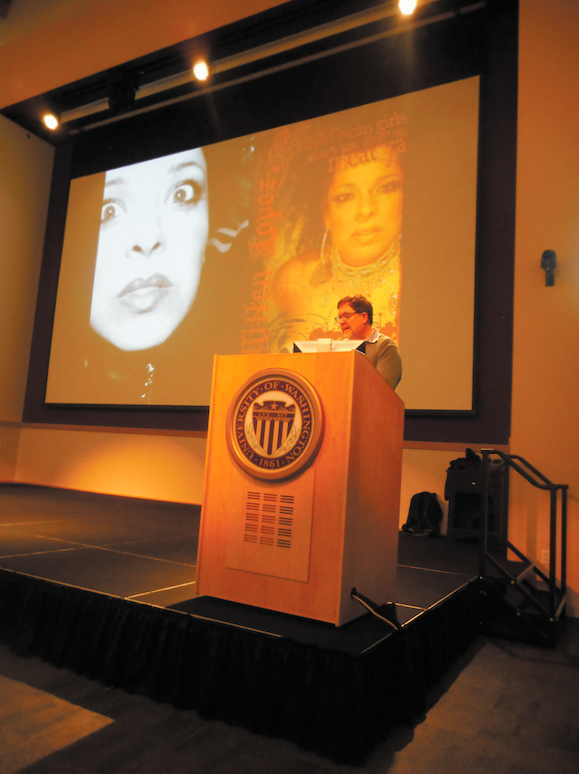 |
| PHOTO BY Michelle De La Cruz |
Over 50 faculty, staff, and students gathered in Jane Russell Commons on April 8 to hear Larry La Fountain-Stokes’ presentation “The Drag of Poverty: Erika Lopez, Holly Woodlawn, Monica Beverly Hillz, Welfare Queens.” Support for the event came from the Arts and Lecture Committee, Division of Culture, Arts, and Communication, American Studies Faculty, Diversity Resource Center and Staff of the School of Interdisciplinary Arts and Sciences. The talk was the first of a two-part tour with a presentation at the UWT on the 8th, followed by a presentation at the Seattle campus on the 9th.
La Fountain-Stokes’ talk is part of a book project entitled Translocas: Trans Diasporic Puerto Rican Drag where he focuses in on transvestism and performance while asserting that drag has the ability to question gender and sexuality and explore things like ethnicity, poverty, and race.
La Fountain-Stokes, author, performer, and Associate Professor at the University of Michigan, focuses his research on drag performance, gender, race, ethnicity, and sexuality in cultural studies, Latin American literature, and performance studies. In the talk, attendees had the opportunity to explore sexualization of Latino/a poverty in the United States. Through examining performances of drag queens in film and television, La Fountain-Stokes walked the audience through what he calls “The Drag of Poverty” and framed a new meaning for “welfare queen.”
La Fountain-Stokes posed questions like, “what does it mean to consider drag as a political act that has the power, not simply to challenge binary gender norms, but also to question other social formations and power structures in society?” and “what does it mean to see drag as something more than mere entertainment?”
The presentation highlighted Erika Lopez’s The Welfare Queen, Holly Woodlawn in Andy Warhol’s film Trash, and Monica Beverly Hillz commonly known from the reality television show RuPaul’s Drag Race. La Fountain-Stokes used these performances to demonstrate how queer Latino/a performers from the working-class, in his words, “have been forced to negotiate challenging life and work environments and to recreate or invent themselves in some cases appropriating and flipping the stigmatized category of welfare queen…historically, marginally, minoritarian subjects such as diasporic Puerto Rican drag queens have been largely excluded from government services or assistance such as welfare or gainful employment…this leaves limited employment opportunities.” He goes on to correlate the spaces these performers find themselves in with limited employment opportunities being the exact places in which we see the aforementioned performances.
The talk concluded with a few questions posed by staff, students, and faculty members for elaboration on how the performers in such different mediums connected and more details on the compensation for the performers on the reality show RuPaul’s Drag Race. The event ended with a reception and a spread of cookies and cake.
Students received the talk well. Student Nathan Pelland said after the talk, “Sometimes I find myself questioning whether Drag Race is an alright representation of queer communities in media…it is very problematic, sometimes it’s transphobic and there are certainly racist attitudes within it…I was very enthralled in this lecture today for hitting many of those points and concerns yet also noting its significance to the gay community.”
American Studies (AMST) faculty such as Ed Chamberlin, who gave the introduction and closed the event, and Dr.Ingrid Walker were glad to have brought La Fountain-Stokes to UWT. The AMST faculty agreed in regard to La Fountain-Stokes’ works, saying that it embodied or brought together the issues covered in the AMST major. With the revamp of the AMST program, events like this shine a light on the major and represent some of the core concepts that are covered or examined in the American Studies major.

No comments:
Post a Comment